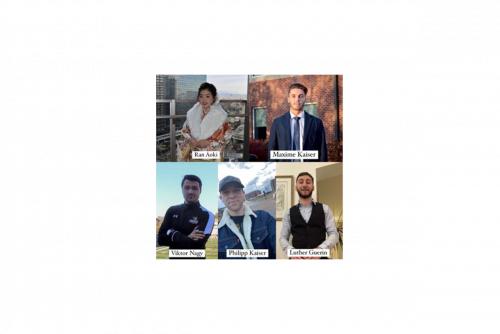
By Bianca Sa
If there is one thing that Lindenwood University must be recognized for, it is their international students’ efforts in coping with COVID-19. It is a well-known fact that Lindenwood has a considerable amount of international students on their campus. Lindenwood has the highest international student body population (13%) in comparison to two other universities in the state of Missouri: University of Missouri – Columbia and St. Louis University, both with an international student body of approximately 6%.
When college campuses first started to shut down due to stay-at-home orders, international students had to be very quick in decision making: should they buy tickets for the earliest flight back to their home countries? Or should they stay in America and wait for the situation to improve? And what would the repercussions for each choice be? Every student faced uncertainty, confusion, and anguish in putting a halt to their college experience and having to find solutions to the unplanned circumstances. Each student has been coping with COVID-19 in a unique way, and some of them are going to be highlighted in this article.
Several students chose to go back to their home countries and weren’t able to return for fall semester 2020 classes. Lindenwood student Maxime Kaiser, from France, was one of them. He chose to go back to France as soon as borders started to close down in several countries, and he ended up staying in his home country until the end of fall semester 2020. For him, virtual learning was very challenging:
“I don’t think I’m efficient when I’m studying online because it’s not a good way for me to study. I need to be in a proper environment – a studying environment, like in the university. When I am in my room, I have class at 9 AM, wake up at 8:55 AM, just make coffee, you’re not even really paying attention. I need to be really concentrated to be efficient and that was not the case from March to December [2020].”
Lindenwood has been offering all courses in the hybrid format, which gives students the freedom to choose whether they want to take classes in person or virtually. Although some students may indeed prefer to study remotely and even perform better doing so, Kaiser’s only choice was to take virtual classes, which unfortunately negatively affected his grades. “France is 7 hours ahead….My courses were supposed to be in the morning, which was evening in France, during dinner. It was not very good,” he reports.
After almost a year of not directly experiencing college life, Maxime was able to travel back to Saint Charles, Missouri, and is extremely happy to be on campus, for he finally finds himself in the setting that most motivates him to study and work towards his career goals. Kaiser has been meeting with his Lion Life Coach, Penny Bryant, who has been working closely with him and has caused a positive impact on his grades.
Kaiser, as well as the other international students I interviewed, have a much greater preference for in-person classes over remote learning, the primary reason being the interaction with other students and professors, as well as the facility to navigate issues with the readily-available resources on campus. Even though the advanced technologies implemented with the new learning environment enable students to continue their studies abroad, it is often difficult to replicate face-to-face interaction over a screen, and it is even more challenging with time zone differences between countries. Philipp Kaiser and Ran Aoki, from Germany and Japan, respectively, express their concern with their English speaking skills, a common issue among international students.
Kaiser has been in Germany since March 2020 and reports how not having access to in-person classes is a barrier for his English speaking proficiency. “It’s my second semester off campus and I can already notice how my English skills are reducing. The online classes are not my main problem; it’s more that you slowly lose the contact with your friends abroad, and staying in contact [with them] gets harder while time moves on.…Of course, I also only speak my native language at home, which makes it a little more difficult to keep up with oral English practices,” he says.
Kaiser further explains, “I pretty much have zero to little English practice on a daily basis. Written skills are nearly every day and I have no problem to keep up with that. However, I can imagine that my spoken English skills will get worse over time and I actually would like to have a daily practice in real conversations because that’s one of the biggest reasons to study abroad.”
Like Kaiser, Ran Aoki is also concerned about not being able to practice her English speaking skills like she used to. But another stressor that has been added to her life is the time zone difference between Japan and the United States. Pulling all-nighters has been part of Aoki’s schedule since she has been studying remotely in her country: “There is a 15-hour time difference, so I am taking classes in the middle of the night. It is very difficult to take classes with such a big time difference,” she says.
The pandemic has caused enough bad outcomes around the world, and it is very easy to be taken by discouragement and sadness. Having a positive mindset in the current situation, therefore, is key for one to thrive and be successful. Viktor Nagy’s positive and hopeful and perspective on the pandemic’s effect on his life is inspiring. Unlike many other international students, Nagy didn’t go back to his home country, Hungary. Instead, he stayed with some family friends in Montana from March through August 2020, before the start of the fall semester.
Nagy sheds light on how he was able to maintain close friendships through the hard times: “I made new friends… new connections, and I’m pretty sure since there was a lockdown in all the areas, I would say that the friendships that I had and that I could maintain got even stronger because of the pandemic – we were holding on to each other and helping each other out. And I hope that happened with other international students as well.”
The pandemic indeed caused a lot of isolation from the social and the physical world, and many not only used this circumstance to get closer to the people closest to them but also as an opportunity to rethink their lives, like Nagy did. “The loneliness caused by the virus created me the opportunity to replan my goals. And after the 2020 summer, as I came back to 2020 fall and 2021 spring semester I feel like I’m much more goal-oriented. I could clear my mind. I had enough time with my thoughts by myself, and that gave me the opportunity to put everything together, create a system, and go by that system, in terms of my future goals,” he says.
Nagy was very productive during lockdown; he kept himself busy by taking summer classes and kept moving forward towards his career goals. He also admires Lindenwood’s amazing support to international students, which was reinforced during the pandemic. The frequent emails and updates students received from the Office of Admissions and Services For International Students (OASIS) served as an “emotional support” for them. And it was with their timely assistance that Luther Guerin, Lindenwood student also from France, was able to return to campus.
To say Guerin is excited to be back at the university is an understatement; “blessed” is the right word to describe how he feels: “I like being here because I can keep improving my English and keep living my American dream. It is a blessing to be here and live the life that many people want to live but cannot, so I just feel blessed and enjoy living in the US. There is [sic] also some good aspects about living here, I can go to the gym every day and if I struggle in a class I can go in-person and talk to the teacher.”
International Students greatly contribute to Lindenwood University’s diversity in student body and learning. Students from over 70 countries promote an accepting and positive community at Lindenwood through the exchange of culture, knowledge, and perspectives about different matters. The university greatly missed the international students who couldn’t return to campus on Fall 2020 and Spring 21, for they all contribute to making Lindenwood so unique. However, as many international students look into coming back for Fall 2021, including Philipp Kaiser and Aoki, Lindenwood cheerfully awaits their return, ready to receive them into their home away from home and help them achieve the success they deserve.
A very special shout-out to all international students, Lindenwood Lions. Your diligence, hard work, and commitment to your studies amidst difficulties are deeply admired.

The Linden Gold
The Linden Gold is a student operated organization focusing on promoting the academic success and achievements of Lindenwood. Through stories about alumni, current students, and faculty alike, The Linden Gold strives to engage with the St. Charles Community and showcase the unique greatness of Lindenwood.












